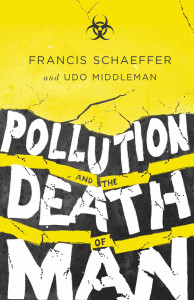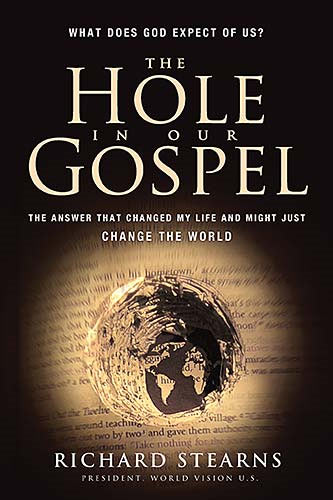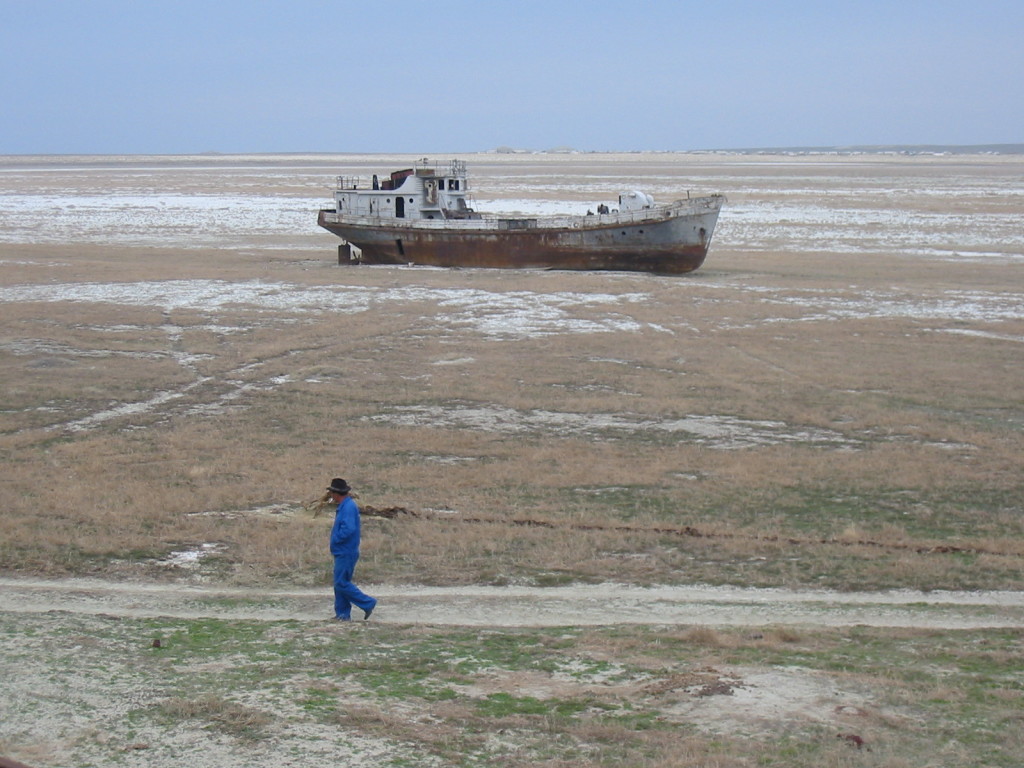Before I began reading his book Pollution and the Death of Man, I had only heard of Francis A. Schaeffer in reference to the Christian pro-life movement. He is one of the founding fathers of the intense conviction that abortion is profoundly wrong and that Christians should do all they can to stop it.
In light of the fact that there are many fellow Christians who are zealously pro-life when it comes to abortion and yet are completely sanguine about the destruction of the rest of life on God’s earth, I couldn’t help assuming that Schaeffer had a similar theological incoherence. This impression was reinforced by the fact that I first heard of the book from listening to Christian radio talk show host Janet Parshall. She regularly refers to Pollution and the Death of Man when she talks in alarm about the growing concern people have for the environment. She reminds her audience that Schaeffer had warned that human dignity would be compromised if humanity was presumed to have anything in common with nature and if humanity’s freedom to use the world in any way was questioned.
Nevertheless, out of curiousity, I ordered the book and read it. I was floored. It certainly conveys a fierce love of God and commitment to the ideas that come from the Bible. But it also fiercely asserts that those ideas uniquely give real value to nature and that Christians have for too long been AWOL in caring for nature the way they should. It contains powerful ideas about what the true relationship should be between humanity and the rest of nature. And these ideas challenge the way Christians have thought about nature and acted towards it for centuries.
Because the book’s essential ideas have been misrepresented and because those ideas are still relevant today, I am using this blog post to share 10 key points about the book. I am including Scheaffer’s own words as much as possible because of their passion and power.
I would also encourage you to learn more about Francis Schaeffer. He was a complex person who led a complex life and challenged, in some way or other, almost everyone. He was a relentless warrior on behalf of Biblical truth in the world of theology and philosophy. There are, in fact, elements of what he wrote and spoke that I profoundly disagree with. He was also a person who desired to bring people together and engage with them in conversation, fellowship, and mutual learning. He and his wife Edith founded the L’Abri community in Switzerland in 1955 which has become a network of learning centers around the world where people can ask honest questions about the Christian faith while enjoying fellowship and hospitality. He also believed that Christians should be compassionate and engaged with the culture around them even as they hold tightly to Biblical truths. Along those lines, he wrote this startling sentence: “Biblical orthodoxy without compassion is surely the ugliest thing in the world.”
You can learn more about him here. The best article I read was by Michael Hamilton in a 1997 issue of Christianity Today (you must, sadly, be a subscriber to read the whole thing). Here is an excellent quotation from that article about Scheaffer:
“Ideas were to him literally matters of life and death. History, thought Schaeffer, taught that the intellectual base on which a people build their society will determine that society’s laws and character: “There is a flow to history and culture. This flow is rooted and has its wellspring in the thoughts of people.” His singular message was that a society cannot hope for righteousness and justice without thinking the thoughts of God from the bottom up.”
This gives you a sense of his intensity and intellectual energy. It also helps you understand a bit why in his view the unmooring of Western civilization from Christian foundations and its movement towards cultural relativism alarmed him.
That same intensity and intellect is displayed in Pollution and the Death of Man. I don’t necessarily agree with every single point he makes. Yet, there is much treasure and truth here. It makes one wonder what would the world would be like if Christians and the Church had been living out the principles Schaeffer presents in this book over the last two millennia. Above all, this book shows that taking the Bible seriously and reading it carefully leads to a profound commitment to being a good shepherd of the earth who finds wonder and beauty in it.
1. Schaeffer wrote in the context of a growing consciousness that humanity is destroying the world that led some to blame Christianity: Published in 1970, Pollution and the Death of Man was Schaeffer’s effort to insert Christianity into the battle of ideas surrounding the realization that nature was being destroyed. In 1962 Rachel Carson’s Silent Spring was published and caused America to rethink its relationship with chemicals. In 1966, the U.S. Bureau of Reclamation released plans to build two dams in the Grand Canyon (can you imagine that?), but the Sierra Club and others vociferously fought those plans and were ultimately successful. In 1969 the Cuyahoga River caught fire for the thirteenth time in its history, a brutal symbol for all that was wrong with America’s use of technology and relationship with nature (check out this article about how local responses to the problem of industrial pollution, not necessarily the Clean Water Act, resulted in the 1969 fire being the last on the Cuyahoga).
Thinkers grappled with the ultimate causes of this environmental destruction. In 1967, Lynn White, Jr.’s article “The Historical Roots of Our Environmental Crisis” was published. In it, he centered the blame for Western civilization’s unrelenting exploitation of nature on Christianity. An expert in Medieval technology, White argued that the paradigm-shifting triumph of Christianity had squashed the notion that there was spirit and sacredness in nature. Instead, it established humanity’s proper role as harsh, exploitative dominators. Nature, in other words, existed solely for the use of humanity. This assumption, White insists, has always made Christianity the most anthropocentric religion in the world.
Another key thesis of White’s was that the tsunami of negative impacts brought by science and technology can’t be addressed by applying science and technology in new ways. Christianity is at the root of the marriage of science and technology and is at the root of the idea that a tree is just a tree and is there for our exploitation. If we don’t change how we think of nature morally and ethically, nothing else will change. And because Western civilization’s great moral ideas come from Christianity, Christianity must be part of any solution. White pointed to Saint Francis as offering a better Christian path of faith and life.
2. Neither polytheism nor modern science are the answers, and both threaten the true nature of humanity: In Pollution and the Death of Man, Schaeffer wholeheartedly agrees that there is an environmental crisis. He also agrees with White that the destruction of nature is, at heart, a religious and moral problem. But he asserts that neither pantheism nor a modern, science-based philosophy are good answers either.
A morality based on either results in only a pragmatic concern for nature. “The only reason we are called upon to treat nature well is because of its effects on man and our children and the generations to come. So in reality,….man is left with a completely egoistic position in regard to nature. No reason is given – moral or logical – for regarding nature as something in itself.”
Schaeffer asserts, too, that pantheism and modernism undercut man’s dignity and will indeed bring the death of man in a metaphorical sense because all is reduced to particles and particles have no meaning. When humanity is merely another part of nature, which both pantheism and modern science suggest, then people can be treated like any other element of nature.
3. The wrong kind of Christianity will lead to wrong views of nature: Listen to these words by Schaeffer:
“It is well to stress, then, that Christianity does not automatically have an answer; it has to be the right kind of Christianity. Any Christianity that rests upon a dichotomy – some sort of Platonic concept – does not have an answer to nature; and we must say with sorrow that much orthodoxy, much evangelical Christianity, is rooted in Platonic concept. In this kind of Christianity there is only interest in the “upper story,” in the heavenly things – only in “saving the soul” and getting it to Heaven.”
In one of the best stories of the book, Schaeffer relates how he walked over to a pagan community across a ravine from a Christian school he was visiting. He was told that he was the first person from the school to ever have visited them. What especially struck Schaeffer was that the Christian school was ugly while the pagan community’s landscape and buildings were beautiful. Schaeffer considers this situation and writes: “Here you have a Christianity that is failing to take into account man’s responsibility and proper relationship to nature.”
Later, Schaeffer writes: “God is interested in creation. He does not despise it. There is no reason whatsoever, and it is absolutely false Biblically, for the Christian to have a Platonic view of nature. What God has made, I, who am also a creature, must not despise.”
4. We should respect what God has created: For Schaeffer, understanding nature properly rests on the fundamental truth that God created the world and the cosmos. God is not part of nature. Nature is separate from God. This, Schaeffer asserts, is the basis for science.
But the distinctness of God from nature does not mean nature is of no value. Because God made nature, all of nature deserves our “high respect.” Listen to what Schaeffer writes:
“But while we should not romanticize the tree, we must realize God made it and it deserves respect because He made it as a tree. Christians who do not believe in the complete evolutionary scale have reason to respect nature as the total evolutionist never can, because we believe God made these things specifically in their own areas. So if we are going to argue against the evolutionists intellectually, we should show the results of our beliefs in our attitudes. The Christian is a man who has a reason for dealing with each created thing with a high level of respect.”
To consider the things of this world as worthless or low, Schaeffer asserts, is to insult God.
In addition, we have God’s own example to follow. Schaeffer writes, “… God treats His creation with integrity: each thing in its own order, each thing the way He made it. If God treats His creation in that way, should we not treat our fellow-creatures with similar integrity? If God treats the tree like a tree, the machine like a machine, the man like a man, shouldn’t I, as a fellow-creature, do the same – treating each thing in integrity in its own order? And for the highest reason: because I love God – I love the One who has made it! Loving the Lover who has made it, I have respect for the things He has made.”
5. Jesus’ death, resurrection, and ascension remind us that all things spiritual and material have value and will be redeemed: The things in front of us are sometimes the hardest to see. Schaeffer looks directly at the historic center of the Christian faith – Jesus’ death, resurrection, and ascension – and sees an affirmation of a principle that is too often overlooked by Christians. He writes: “The resurrection and ascension prove there is no reason to make false dichotomy between the spiritual and the material. That is a totally non-Biblical concept.” In other words, matter matters. Nature matters.
Schaeffer pays attention, too, to the eighth chapter of the book of Romans. “As Christ’s death redeems men, including their bodies, from the consequences of the Fall, so His death will redeem all nature from the Fall’s evil consequences at the time when we are raised from the dead.” In other words, nature is an essential part of the Biblical story of the world from the beginning to the end.
6. Separate from yet united with nature: A core theological concept for Schaeffer is that the God of Christians is unique “in being both infinite and personal.” All of matter is separated from God who is the Creator and who is infinite and who has always been. Yet, God created people in God’s image, which makes them unique. This means that people have a unique relationship with God that the rest of nature does not.
While many Christians stop right there, Schaeffer doesn’t. He asserts that we simultaneously have two different relationships with nature. Yes, we are unique, we are separate, and we do have dominion (the right kind of dominion). But we also have fellowship with everything else in nature. Why? Because we collectively share the same status – we are all creations of God.
“This is the true Christian mentality. It rests upon the reality of creation out of nothing by God. But it also follows that all things are equally created by God. All things were equally created out of nothing. All things, including man, are equal in their origin, as far as creation is concerned.” (Those italics are Schaeffer’s.)
Schaeffer emphasizes this point throughout the book. Here is a startling line in the context of the balance Schaeffer advocates between our right to use nature wisely for our ends and our fellowship with the rest of nature. “Even the moss has a right to live. It is equal with man as a creature of God.”
Humans, especially Christians, however, are quick to assert that we are distinct and separate from the rest of nature. Schaeffer would agree that we are distinct and different and would argue that our ability to have consciousness, choice, and will power are key elements of our uniqueness. This presents a fundamental and spiritual challenge to us. We as humans do have options. We have choices. One of our fundamental choices is whether we do all to nature that we have the capacity to do.
Unthinkingly using all of our unique capacities to manipulate the rest of the created order for our satisfaction and convenience at the cost of nature’s vitality lowers us to the state of the rest of the natural order. Conversely, making the conscious choice to limit ourselves for nature’s prosperity affirms our own humanity.
This is where Schaeffer is making, I believe, a subtle argument that people like Janet Parshall are not picking up. It is easy to conclude that Schaeffer’s title refers only to the idea that pantheism and modern materialism, as reactions to the ongoing destruction of nature, will lead to the death of man. But Schaeffer is also all but saying explicitly that if we do not exercise conscious and moral choices in relation to nature than we are also denying human uniqueness. In fact, if we do that, we are acting with exactly the same values that would flow naturally from an evolutionary, materialist perspective. In other words, not limiting ourselves in how we use our creative powers to extract from nature what we want and not opening ourselves to a psychological relationship with nature leads also to the spiritual death of man even if we have some theologically correct ideas of God.
7. Christians have acted badly: Christianity has, in Schaeffer’s estimation, the answer to the environmental crisis. This is because “It is the Biblical view of nature that gives nature a value in itself…” Nature, in other words, is not just valuable for its practical benefit to us but has its own ethical and spiritual standing. And if we give ourselves to God and allow God to guide our values and actions, then we will treat nature as it should be treated.
But despite having a clear basis for acting rightly toward nature, Christians haven’t. In fact, Schaeffer’s story of the pagan community across from the Christian school captures the sense that Christians have done far worse than many non-Christians in how they treat nature.
“The Christian is called upon to exhibit this dominion, but to exhibit it rightly: treating the thing as having a value in itself, exercising dominion without being destructive. The church should always have taught and done this, but it has generally failed to do so, and we need to confess our failures. Francis Bacon understood this, and so have other Christians at different times; but by and large we must say that for a long, long time Christian teachers, including the best orthodox theologians, has shown a real poverty here.”
And Christians have committed sins of omission throughout history by not defending nature.
“They (hippies) were right in fighting the plastic culture, and the church should have been fighting it, too, a long, long time ago before the counterculture ever came onto the scene.”
Schaeffer even poses this powerful question: “…what would have happened if the church at the time of the Industrial Revolution had spoken out against the economic abuses which arose from it?”
And listen to this critique of Christians and their selective interest in nature that is, 45 years later, as trenchant and stinging as ever.
“Nature has become merely an academic proof of the existence of the Creator, with little value in itself. Christians of this outlook do not show an interest in nature itself. They use it simply as an apologetic weapon, rather than thinking or talking about the real value of nature.”
Amen. AMEN.
Schaeffer takes that line of argument a step further.
“We must confess that we missed our opportunity. We have spoken loudly against materialistic science, but we have done little to show that in practice we ourselves as Christians are not dominated by a technological orientation in regard either to man or nature. We should have been stressing and practicing for a long time that there is a basic reason why we should not do all that with our technology we can do. We have missed the opportunity to help man save his earth. Not only that, but in our generation we are losing an evangelistic opportunity because when modern people have a real sensitivity to nature, many of them turn to the pantheistic mentality. They have seen that most Christians simply do not care about nature as such.”
This is one of the reasons why Schaeffer believes the church has become “irrelevant and helpless in our generation.”
“We are living in and practicing a sub-Christianity.”
In other words, when Christians articulate and live out a faith that is not whole, that does not give proper emphasis to the earth and cosmos, then people are not to be blamed if they find the Christian faith unappealing, inauthentic, and inadequately challenging and so decide not to become disciples of Jesus.
Ultimately, Schaeffer levels a damning suggestion about the impact of a wrong view of nature as well. He suggests, in the form of questions, that our faith in God is not real, that we don’t truly love God (the ultimate Lover), that our faith is not whole and complete and alive in us, if we don’t care for nature.
“If I love the Lover, I love what the Lover has made. Perhaps this is the reason why so many Christians feel an unreality in their Christian lives. If I don’t love what the Lover has made – in the area of man, in the area of nature – and really love it because He made it, do I really love the Lover?”
8. The Church should bring substantial healing to nature: Schaeffer believes that the Fall caused many divisions – man from God, man from himself, man from other people, man from nature, and even nature from nature. These divisions will eventually be completely healed when Christ returns to earth. But we are not simply to wait passively until then. Christians are to believe that with God’s help “substantial healing can be a reality here and now.” “God’s calling to the Christian now, and to the Christian community in the area of nature (just as it is in the area of personal Christian living in true spirituality) is that we should exhibit a substantial healing here and now, between man and nature and nature and itself, as far as Christians can bring it to pass.” In short, the Church and the local church are to do their best within their sphere of influence to live out God’s healing of all relationships as a sign of what God’s kingdom will look like when fully established in all dimensions of life.
What are some characteristics of the substantial healing the Church and the local church should bring?
One is an emphasis on Creation. It is important and not some secondary, optional, tertiary concern.
Another is the right idea of dominion. Dominion is not sovereignty. “It (nature) belongs to God, and we are to exercise our dominion over these things not as though entitled to exploit them, but as things borrowed or held in trust.”
And at the heart of the correct understanding of dominion is the concept of conscious, self-imposed limitations in light of the fact that our dominion is under God’s dominion and that nature is something God values. We will accept limits to our freedom for the sake of what is good and holy. We will not do all that we can do with science and technology. We will be patient.
9. The Christian who gets the relationship with nature right will have a psychological bond with it: Schaeffer is careful not to condone a romanticization of nature but in a nuanced way he repeatedly declares that we can and should have a psychological bond with nature because we know that we are distinct from nature and yet part of it.
“Psychologically, I ought to “feel” a relationship to the tree as my fellow-creature. It is not simply that we ought to feel a relationship intellectually to the tree, and then turn this into just another argument for apologetics, but that we should realize, and train people in our churches to realize, that on the side of creation and on the side of God’s infinity and our finiteness we really are one with the trees!”
Elsewhere Schaeffer writes, “In this sense Saint Francis’s use of the term “brothers to the birds” is not only theologically correct, but a thing to be intellectually thought of and practically practiced. More, it is to be psychologically felt as I face the tree, the bird, the ant.”
He also writes, “Because it is right, on the basis of the whole Christian system – which is strong enough to stand it all because it is true – as I face the buttercup, I say: “Fellow-creature, fellow-creature, I won’t walk on you. We are both creatures together.””
10. Making the choice to accept limits and treat nature rightly brings many benefits: When Christians and the Church act toward nature and relate with nature in the way they should, Schaeffer asserts there will be substantial healing. This healing will be seen in a “new sense of beauty.” “The aesthetic values are not to be despised. God has made man with a sense of beauty that no animal has; no animal has ever produced a work of art. Man as made in the image of God has an aesthetic quality, and as soon as he begins to deal with nature as he should, beauty is preserved in nature.”
And the resulting improvement in the ecological condition of the world will benefit the long-term health of our economy as well as the value of humanity.
We will also experience a renewed sense of wonder. I love this line from Schaeffer in connection with this them: “Life begins to breathe.” And, provocatively, he calls attention to the fact that Charles Darwin shared in his notes that as he got older he lost his joy in the arts and in nature. By contrast, people who believe in God’s creative force behind the world’s creation can and should find that nature inspires joy and wonder.
Finally, choosing to relate to the nature as God intended will endow us with psychological freedom and open up an enhanced relationship with God.
My guess is that you already knew that.











